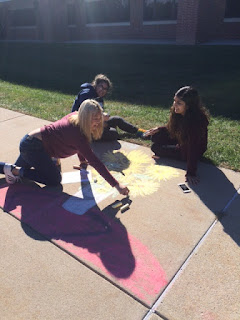...it is important to study and learn other languages! But how does on actually learn another language? Here are some good tips and thanks to http://www.twu.edu/ for their great advice!
HEALTY HABITS TO
LEARNING A WORLD LANGUAGE
Language learning is a highly cumulative process. It is like
making a tower out of blocks: you keep building on top of what you did the day
before. If you don't keep at the job steadily, pretty soon you're trying to put
new blocks on top of empty space. Thus it is important to keep up with and
learn what is being presented to you about a language day by day. The following
is a list of suggestions which may aid you in your study of a foreign language.
As the four major parts to language learning are listening, speaking, reading,
and writing, the suggestions are divided in that way.
LISTENING AND
PRONUNCIATION
1. The basis of all language is sound. Become familiar with
the pronunciation of the words in the language and learn what to listen for
when the language is spoken.
2. Proper pronunciation takes a great deal of practice.
Begin early learning the new lip and tongue movements correctly.
3. Improve your pronunciation by listening to the language
(from people, records, tapes, or movies) and pronouncing the words yourself
until they sound correct. Listen with the aim of accurately reproducing what
you have heard.
4. Listen to yourself on tape and practice the sounds by
repeating them over and over until you feel comfortable with them. You might
let another person also judge your pronunciation.
5. Focus on the meaning of what is being spoken as well as
on pronunciation.
SPEAKING
1. Do not be concerned with speed, but rather, with
accuracy.
2. Practice in speaking should be constant. When reading the
language, read aloud if possible. Meet with other classmates at a designated
time and converse with each other exclusively in the language.
3. Learn sentence structure. It is one thing to know the meanings
of foreign words and quite another to be able to put them together correctly to
form a meaningful sentence
READING
1. Know English grammar terms. Keeping a grammar book or
dictionary handy is a help. Also learn new grammatical terms used in the language
you are studying.
2. When you read, do so with a focus on the total meaning of
a sentence or passage and avoid looking up unknown words but, rather, attempt
to determine their meanings based on the context of the sentence.
3. Always study notes which accompany a passage which is to
be read or translated. Try reading the passage to be translated three times.
Read it initially, without translating, in order to get a feel for the language
and how the words fit together. Read it a second time and translate the
passage. Then reread the passage a third time for meaning. This will help you
begin to think in the language. When reading, try reading by phrases or whole
sentences and read aloud.
VOCABULARY
1. There are several things that can be done to aid in
learning vocabulary. Memorization is important and good knowledge of the rules
of grammar in the language studied will aid this process.
2. Master all of the vocabulary for each lesson. You may
want to make flash cards for yourself to aid in this process. Take a 3 x
5" card and write the word on one side with its English equivalent on the
other. Try going over them at least once a day and keep the number of words you
are working with small. When you have learned the word on a card remove that
card from the others. Phrases may also be put on flash cards.
3. Try learning the names of the everyday things around you.
Pick, for example, four new things a day to learn.
4. Try these four steps in learning a new word: (1)
pronounce and spell it; (2) study its meaning; (3) use it in a sentence of your
own; (4) write it and its meaning three times.
WRITING
1. Study all textbook
material before you begin to write.
2. While you are writing, pay attention to spelling, form,
irregularities, and word order.
3. Be aware of sentence structure and grammar.
HABITS ARE LEARNED BY OVER LEARNING...PRACTICE, PRACTICE, and PRACTICE!













